- Home
- Joan Lowery Nixon
Search for the Shadowman Page 9
Search for the Shadowman Read online
Page 9
“And be reminded of it now and again by Miz Minna,” Mrs. Thomas added. “Unfortunately, your family search has brought the story to life again. Last night was humiliating for Miss Winnie.”
“I’m sorry,” Andy said. “I didn’t know that was going to happen.”
“So therefore—” his father began.
“I haven’t finished!” Andy was desperate. “You said you’d listen to me.”
Mr. Thomas looked at his watch. “Make it quick,” he said.
“I don’t believe Coley Joe took the money,” Andy told them. He told them all he had learned about Coley Joe, then added, “And tomorrow Mrs. Alonzo may find out if there’s any record that Coley Joe was killed at San Elizario.”
Mrs. Thomas’s eyes sparkled. “Andy, that’s a wonderful piece of research. And Mr. Hammergren thinks you can enter a contest and maybe win a scholarship for it? How exciting!”
Mr. Thomas rubbed his chin. “If Andy can prove his case, think what that will mean to Miss Winnie.”
“Does that mean you’ll let me keep on searching?” Andy asked.
“Well …” Mrs. Thomas glanced toward the house next door. “Both Miss Winnie and Grandma Dorothy asked us to forbid you to even mention Coley Joe again.”
“Suppose we reach a compromise,” Mr. Thomas said. “You said you might find out tomorrow if Coley Joe was listed among those who were killed at San Elizario?”
Andy nodded.
“We’ll give you a few more days,” Mr. Thomas told Andy. “You should know by then if you’re making any progress or if you’ve come to a dead end.”
“What about the scholarship contest?”
“You can’t very well write an essay about your search if you haven’t turned up anything conclusive, can you?”
“I know what you mean.”
“I see a couple of real problems, unless you’ve found information you haven’t mentioned to us,” Mr. Thomas said. “Elton told you that the Bonners had proof that Coley Joe was the thief. Miz Minna and even Grandma said something about proof. What is this proof?”
“I don’t know yet,” Andy said. “I don’t think they do either.”
“You have to face the fact that this proof, if you find it, may make all your work come to nothing.”
His mother put a hand on Andy’s shoulder and smiled. “Don’t look so discouraged, Andy. We’re proud of what you’ve done. You gave yourself a goal, and you’re doing your best to reach it. That’s what’s important, not whether Coley Joe Bonner is guilty or innocent.”
But Andy didn’t agree. Proving Coley Joe innocent was what he had started out to do, and he wouldn’t be satisfied until he’d accomplished it.
That afternoon, when J.J. came over, he brought a sheaf of papers. “You said you didn’t need these, but I thought you might change your mind,” he said. He pointed to the top sheet. “It all starts in January 1878, with the first James Jonathan Gasper, when he came to Hermosa and invested in a mercantile company and a bank. That’s where he made his big start.”
Andy glanced at the papers, then tossed them onto the table. At the moment, the last thing he was interested in was the history of the Gasper family. “Thanks,” he said to J.J. “Want to ride down to the park and see if anyone’s got a basketball game going?”
“Sure,” J.J. answered. “Anything but homework.”
On Monday, Andy couldn’t keep his mind on his class-work. All he could think about was what Mrs. Alonzo might find out about Coley Joe.
History class ended, with Mr. Hammergren’s reminder that the family reports were due on Friday. But as Andy followed J.J., heading toward the door, Mr. Hammergren stopped him.
“What’s up, Andy?” he asked. “You’ve been jumpy as a pup with chiggers.”
“Mrs. Alonzo, down at the library, said she’d contact the Texas State Archives in Austin. She said there were probably official reports about the Salt Wars, and they might contain the names of the four men who were killed there.”
“And you’re hoping that one of them was Coley Joe Bonner.”
“It’s worth a try.”
Mr. Hammergren smiled and held up a sheet of paper. “Here are the rules for entering that state history contest I told you about. I asked the head of the committee to fax them to me.”
“I told my mom and dad about the contest,” Andy said. “My mom got kind of excited.”
Mr. Hammergren grinned. “I’m excited, too. Let me know what you find out today. Okay?”
“You bet I will,” Andy said. He ran to catch up with J.J.
After school Andy pedaled to the library as fast as he could, grumbling at stoplights and slow-moving pickup trucks. He leaped from his bike, shoved it into the parking rack, and raced up the steps of the James Jonathan Gasper Memorial Library.
As Andy skidded to a stop at the check-in desk, Mrs. Alonzo looked up and smiled.
“Come with me,” she said. “I’ve got some information for you.”
“About Coley Joe?” Andy asked. His stomach knotted, and it was hard to breathe.
Mrs. Alonzo didn’t answer. She sat with Andy at a table in the far corner and spread out two sheets of paper. “Here’s the name of the woman I talked to in the Texas State Archives office. She said they are allowed to spend up to forty minutes on each telephoned question, and no more, but she was able to give me the information I asked for.”
“About Coley Joe?” Andy repeated.
Mrs. Alonzo couldn’t be hurried. “There are two reports in the archives,” she said. “One is ‘The Adjutant General’s Report for the Fiscal Year,’ published on August 1, 1878. The other is Executive Document number 93, from the Forty-fifth Congress, second session, Texas House of Representatives, titled, ‘El Paso Troubles in Texas.’ The first is the U.S. Army’s official report, which includes the Salt Wars. The second contains the report of the Texas Rangers.”
Andy couldn’t stand the suspense. “Do they say anything about Coley Joe?”
Mrs. Alonzo sighed. “Not exactly,” she said.
“Not exactly? What does that mean?”
“It means that those four men who were killed—the men mentioned in The Handbook of Texas—are identified and named in the reports. None of them was Coley Joe Bonner.”
Andy slid down in his chair and scowled at his toes. “I was hoping so hard I’d find him,” he mumbled.
“Don’t give up,” Mrs. Alonzo told him. “These were men known in the community. The Texas Rangers’ report goes on to mention numerous murders and robberies.”
“Murders?”
“There’s a description of the mob action in looting and various shootings. Some looters were killed, and some ran off into Mexico to escape the law.”
“Coley Joe wasn’t part of a mob. He wouldn’t loot.”
“Of course he wouldn’t. But if his body was found in the area of the riots and he had no identification, he could have been mistaken for someone in the mob of rioters.”
“Hey! Yeah!” Andy said. He slid back up in his chair, hope rising again until he realized that more than a hundred years later there’d be no way of identifying Coley Joe.
“Did Coley Joe Bonner have any unusual identifying marks that might have attracted notice?” Mrs. Alonzo asked.
Andy shrugged. “You mean like a birthmark or …” He sat upright. “A nail!” he said. “Each of the men in the Bonner family wore a nail, hammered into a circle, on a leather thong around his neck. Like …” He reached for the one he had worn briefly, suddenly remembering that it was still lying on top of Grace Elizabeth’s poetry book in his bedroom.
“The reports didn’t go into details like that,” Mrs. Alonzo said. “But there are other places we can try.”
Andy was puzzled. “Like what?”
“Think about it. Where do you get detailed information when local crimes are committed?”
“TV news!”
“In 1877?”
Andy laughed. “Okay, in newspapers.”
; “Surely El Paso was large enough to have a newspaper in 1877. Let’s find out.”
“How?” Andy asked.
Mrs. Alonzo shoved back her chair and beckoned to Andy. “We’ll call the Texas History Department at the El Paso Public Library.”
Andy waited by the counter near her desk while Mrs. Alonzo made the telephone call. At one point she covered the mouthpiece of the phone with her hand and said, “There was a semiweekly newspaper called The Lone Star, published from 1876 through 1888. They have only scattered copies—among them very few in the seventies—but she’s going to see what might turn up.”
Mrs. Alonzo suddenly turned back to the phone. “No description of the bodies? I see. Who?” She picked up a pen and began writing. Finally she thanked whomever she was talking to and hung up the phone. She handed Andy a slip of paper.
“There’s a history professor at the University of Texas at El Paso who’s a collector. He owns a few early copies of The Lone Star that might have the information you need.”
Andy read the name: Dr. Palius Rundle.
Could Dr. Palius Rundle be DrPR? The person he’d met through e-mail? All this time, had DrPR held the answer?
CHAPTER THIRTEEN
As he pedaled for home, Andy realized with embarrassment that he had never thanked DrPR for his earlier information. Well, now he’d thank him and ask him for new information—all at the same time.
In spite of his trip to the library, Andy was still the first one home. Not even stopping for something to eat, he booted up the computer and clicked on e-mail. The message from DrPR was still there, so Andy clicked on reply, and a fresh writing screen came up.
“Thanks for the information about The Handbook of Texas,” Andy wrote. He went on to tell DrPR about his guess that Coley Joe might have been killed in San Elizario. “He was probably medium tall,” Andy wrote, “with dark, curly hair. He may have died without any identification, but he wore a horseshoe nail, hammered into a circle, on a leather thong around his neck. It wasn’t valuable to anyone except the men in the Bonner family, so it wasn’t likely to have been stolen. If you can find a news story in your collector’s copies of The Lone Star that describes any of the unidentified victims found after the battle, I would really appreciate hearing from you by e-mail.” He thought a moment and added, “as soon as possible.” Then he ended with “Thank you.
Before sending the message, Andy hesitated. He jumped out of the chair, raced upstairs, and grabbed the hammered nail, pulling the thong over his head. Without a pause, he galloped down the stairs into his dad’s office and clicked on send. It wasn’t that he was superstitious or anything like that. He, Andy, was a Bonner and related to Coley Joe. He would wear the Bonner nail until he closed the circle by proving that Coley Joe was not a thief.
He reached out to disconnect the modem when the computer’s voice announced, “You’ve got mail.”
Andy clicked on the mailbox icon, holding his breath as he saw that there was an e-mail message for him from DrPR. He pressed enter, and up came a letter.
“You know about my collection, Hunter, so you must know my name. How did you find out?”
Andy wrote back, “Through the Texas History Department of the El Paso Public Library. They gave my librarian your name and address. I’m the one who made the e-mail connection. I didn’t write to you by snail mail, because if I don’t come up with the answers this week, my dad says I have to stop my search. Do you want to know more about Coley Joe?”
The answer arrived less than a minute after Andy had sent his message. “I’m very much interested. And I’m interested in you and why you’re researching this person.”
Andy told DrPR about Coley Joe and how everyone had believed that he’d stolen his parents’ money and disgraced his family. He told him that Coley Joe had written to his girlfriend that he was going to San Elizario to buy cattle from someone who was eager to sell. Then he wrote that he, Hunter, was in the seventh grade and all this had started with a homework assignment to interview older family members about their lifestyles when they were young.
The answer Andy had hoped for came back. “Here’s something I found in a December 1877 issue of The Lone Star. This might be the information for which you’re searching.”
DrPR went on to copy part of a newspaper article:
THE STREETS WERE SHOWERED WITH BROKEN GLASS AND SPLINTERED WOOD, WRECKAGE LEFT BY THE MOB THAT LOOTED SAN ELIZARIO, THEN FLED TO MEXICO TO ESCAPE THE POSSE COMPOSED OF ANGRY CITIZENS, TEXAS RANGERS, AND UNITED STATES ARMY TROOPS. HERE AND THERE WERE SCATTERED THE LIFELESS FORMS OF THE FEW WHO HAD BEEN CUT DOWN BY GUNFIRE BEFORE THEY COULD ESCAPE. ONE HAD BEEN A BOY, PROBABLY ONLY FOURTEEN OR FIFTEEN YEARS OF AGE WHEN HE DIED, HIS POCKETS FILLED WITH STOLEN ITEMS. NEAR WHERE I STOOD LAY THE BODY OF A DARK-HAIRED YOUNG MAN WHO HAD BEEN SHOT IN THE BACK OF THE HEAD. HIS SHIRT AND JACKET WERE MISSING, HIS TROUSERS TORN, AND AROUND HIS NECK, ON A LEATHER THONG, HE WORE AN INEXPENSIVE HORSESHOE NAIL, HAMMERED INTO A CIRCLE.
Andy let out a yelp and jumped up so fast, his chair toppled over. “It was Coley Joe!” he shouted. “I found Coley Joe!”
But as Andy thought again about what he had read, he pictured Coley Joe lying dead among strangers, no one even knowing who he was. With a sorrow that made his eyes burn and his throat ache, Andy righted the chair and lowered himself into it. “I’m sorry, Coley Joe,” he said aloud. “But all along I knew you hadn’t taken the money. This news story proves it. Now maybe everyone will believe me.”
Andy printed the letter, then sent an e-mail message to thank DrPR.
“It was a pleasure to help you in your quest,” DrPR replied. “I hope we may correspond again.”
Andy exited Windows and turned off the computer. So excited that his heart was thumping in his ears, he climbed the stairs to his bedroom.
Scarcely realizing what he was doing, he sat on the edge of his bed and picked up the poetry book. In his mind rose the vision of the sad-eyed woman who had looked at him so beseechingly in his dream. He felt as if he were back in the dream, gray mists swimming around him. “Miz Grace Elizabeth, your son didn’t steal your money,” Andy murmured aloud.
The telephone suddenly rang, whamming Andy into the present. He started so violently that the book sailed from his hands, slamming against his chest of drawers.
Andy ran into his parents’ room and caught the phone on its third ring.
“Andy dear.” Miz Minna’s voice purred in his ear.
Andy grimaced. The last person in the world he wanted to talk to was Miz Minna. “I’m sorry,” he said politely, “J.J.’s not here.”
“Oh, I know that,” Miz Minna said. “I don’t want to talk with J.J. He’s gone shoe shopping with his mama and won’t be back for a couple of hours. It’s you I want to talk to—while J.J.’s not here.”
“Miz Minna, ma’am, I don’t think I—”
Her voice sharpened. “Andy, we need to talk. I’d very much appreciate it if you’d come on over here within the next fifteen or twenty minutes. Lila will let you in.”
As Andy paused, she said, “I told you about proof that Coley Joe stole his family’s money. Well, I’ve got that proof, and now I’m willing to show it to you.”
Andy thought about the information he’d received from Dr. Palius Rundle. “I don’t need to see it,” Andy said.
Miz Minna sighed and said, “My, my, you’re a stubborn boy. Well, here’s one warning you just might pay attention to. You get over here and see what I’ve got to show you, or I’ll send a copy of it directly to Miss Winnie. Maybe even to the newspapers.”
Andy frowned at the phone. Miz Minna had no right to hurt Miss Winnie. And he knew that Miz Minna had no real proof that Coley Joe was a thief. She was either mistaken or lying to him. But Andy’s curiosity was growing. The least he could do was see what she insisted on showing him.
He walked slowly back to his room and bent to pick up the poetry book. Its front cover was twisted back, the endpaper pulled away from the binding, expos
ing dried splotches of glue.
As Andy gently picked up the book, he saw two thin, folded sheets of paper that had been tucked underneath the endpaper.
They were brittle, and they crackled as he carefully smoothed them out to read them. As he recognized the handwriting on the first letter, Andy sucked in his breath.
Dearest Mother, the letter began. As in the letters Coley Joe had written to Felicity, he described the thriving town of El Paso, with its heat and bustling traffic that kicked up clouds of choking dust on its dry streets. He even spoke about its background of purple-shadowed mountains, whose rugged peaks stretched into a clear, cloudless sky.
Then he wrote:
I treasure the trust that you and Father have placed in me by allowing me to purchase livestock and make arrangements for the building of our new home. My friend, James Jonathan Gasper, chief clerk for District Judge Charles Howard, will accompany me to San Elizario to buy cattle.
Coley Joe had written loving messages to the rest of his family, but Andy was unable to read them. Stunned by his discovery, he sat with the letter on his lap, staring into space. What had J.J.’s information sheet said about the first James Jonathan Gasper? He had come to Hermosa in January 1878. That was one month after Coley Joe’s death.
And J.J. the First had come to Hermosa with enough money to open a mercantile store and found a bank, even though Coley Joe had written to Felicity that his friend had little money and was underpaid.
With trembling fingers Andy picked up the second letter. It was written in a bolder hand than Coley Joe’s, and the signature at the bottom was that of James Jonathan Gasper.
Dated March 1878, the letter began:
How fortunate that your son had given you my name, so that you were able to trace my whereabouts to Hermosa. I am unable to satisfactorily answer all your inquiries, however. Cole Joseph Bonner and I were not friends. We were mere acquaintances, so I was unaware of his obligations to his family and that he had broken off communication with you.

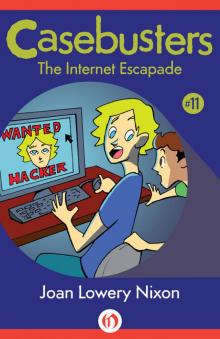 The Internet Escapade
The Internet Escapade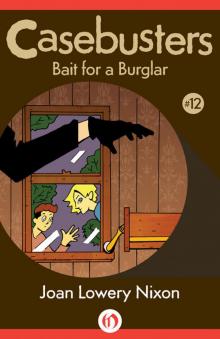 Bait for a Burglar
Bait for a Burglar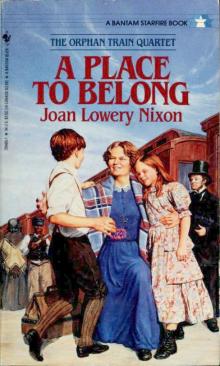 A Place to Belong
A Place to Belong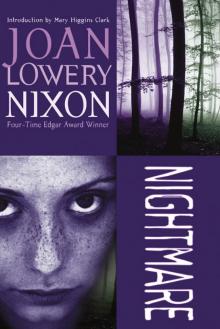 Nightmare
Nightmare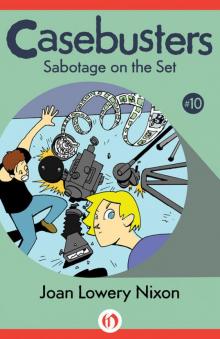 Sabotage on the Set
Sabotage on the Set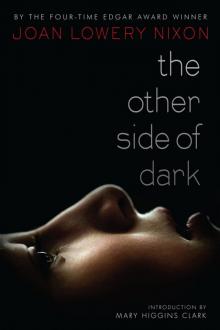 The Other Side of Dark
The Other Side of Dark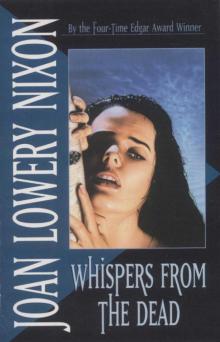 Whispers from the Dead
Whispers from the Dead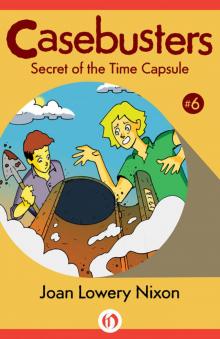 Secret of the Time Capsule
Secret of the Time Capsule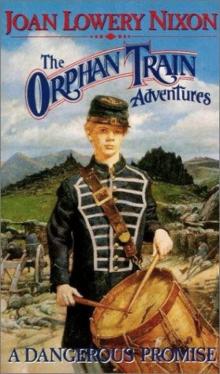 A Dangerous Promise
A Dangerous Promise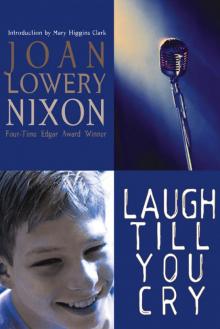 Laugh Till You Cry
Laugh Till You Cry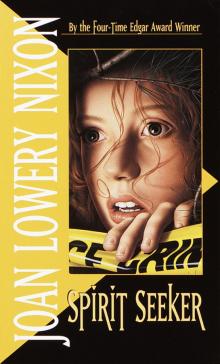 Spirit Seeker
Spirit Seeker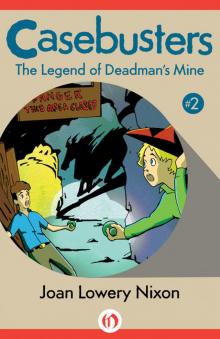 The Legend of Deadman's Mine
The Legend of Deadman's Mine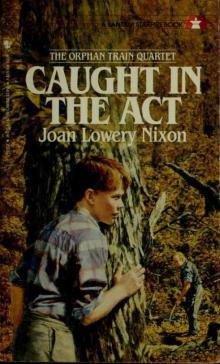 Caught in the Act
Caught in the Act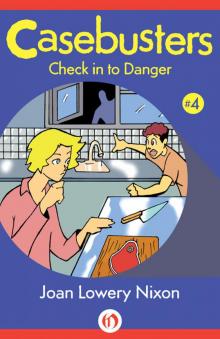 Check in to Danger
Check in to Danger Ellis Island: Three Novels
Ellis Island: Three Novels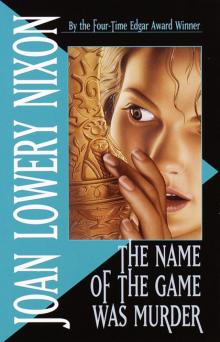 The Name of the Game Was Murder
The Name of the Game Was Murder The Haunting
The Haunting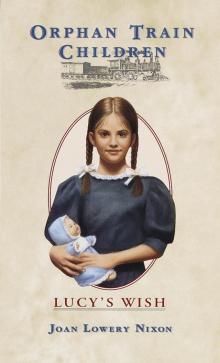 Lucy’s Wish
Lucy’s Wish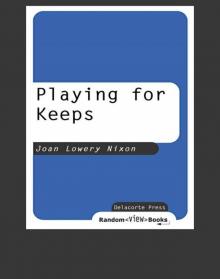 Playing for Keeps
Playing for Keeps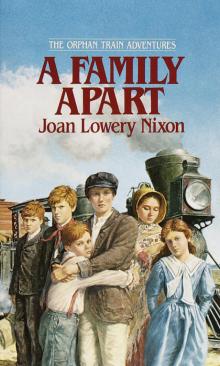 A Family Apart
A Family Apart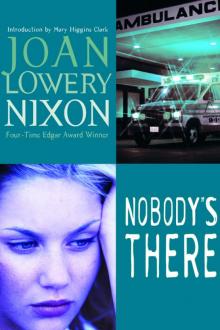 Nobody's There
Nobody's There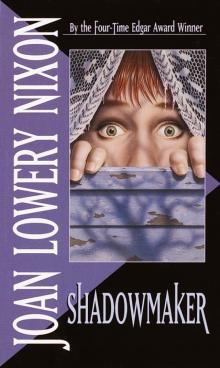 Shadowmaker
Shadowmaker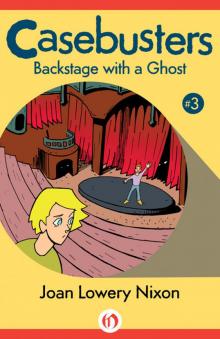 Backstage with a Ghost
Backstage with a Ghost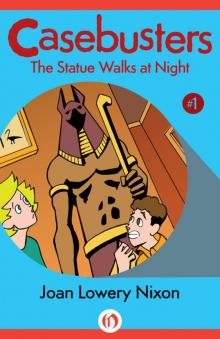 The Statue Walks at Night
The Statue Walks at Night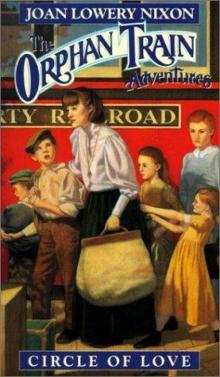 Circle of Love
Circle of Love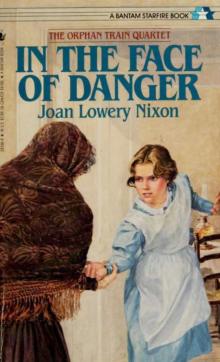 In the Face of Danger
In the Face of Danger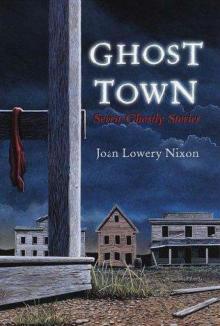 Ghost Town
Ghost Town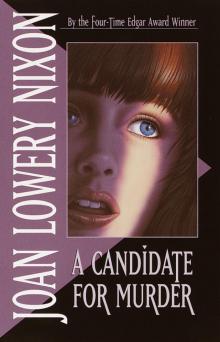 A Candidate for Murder
A Candidate for Murder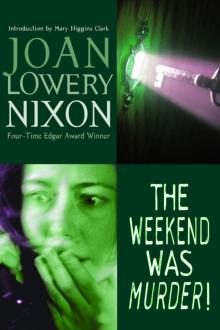 The Weekend Was Murder
The Weekend Was Murder The Island of Dangerous Dreams
The Island of Dangerous Dreams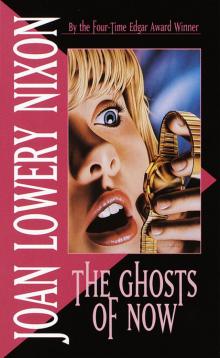 The Ghosts of Now
The Ghosts of Now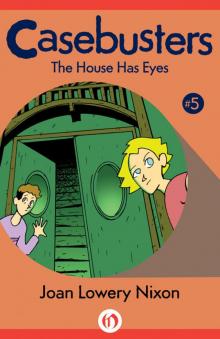 The House Has Eyes
The House Has Eyes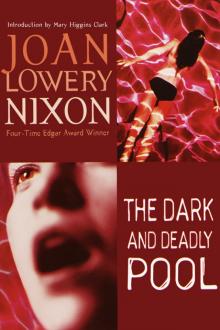 The Dark and Deadly Pool
The Dark and Deadly Pool Keeping Secrets
Keeping Secrets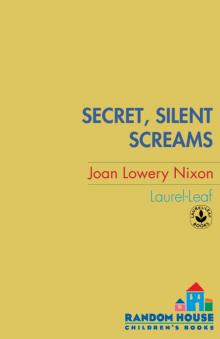 Secret, Silent Screams
Secret, Silent Screams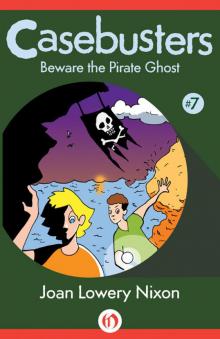 Beware the Pirate Ghost
Beware the Pirate Ghost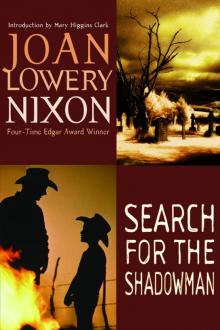 Search for the Shadowman
Search for the Shadowman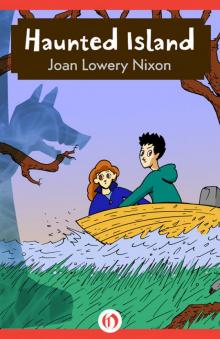 Haunted Island
Haunted Island